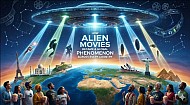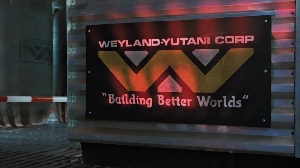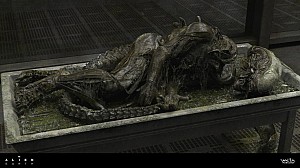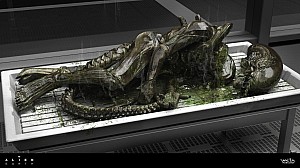This post was published by a guest. The views expressed are those of the author and do not necessarily reflect the views of alien-covenant.com.
The Alien universe is far more than a masterclass in horror and suspense. It is a chilling, multi-layered dystopia that exposes our modern-day worship of corporate control and relentless profiteering. At the core of its narrative lies Weyland-Yutani, a fictional megacorporation whose unethical policies, disregard for life, and monopolistic behavior mirror the most alarming aspects of contemporary capitalism. This article peels back the layers of the Alien saga to reveal how it subtly yet powerfully reflects real-world corporate practices, greed, and a future where human existence is subordinate to shareholder interests.
Sci-Fi as a Mirror of Modern Capitalism
Ridley Scott’s Alien was not merely a cinematic horror milestone. Its foundation is rooted in a broader commentary about how corporations manipulate systems to prioritize profit over people. Through terrifying imagery and bleak corporate indifference, the series questions who truly controls the future of humanity. The real villain is not the Xenomorph, but the faceless, calculating system that unleashes it: Weyland-Yutani. Their presence looms large, subtle yet omnipresent, enforcing the idea that every breath taken, every move made, is tracked, owned, and expendable for the sake of dividends.
Weyland-Yutani: A Corporation Without Boundaries
Weyland-Yutani is not simply a company—it is a dystopian embodiment of unchecked privatization and amoral ambition. Their resume is terrifying: deliberate experiments on lethal Xenomorphs, exploitation of both colonists and synthetic beings, and calculated sacrifices of human lives to preserve intellectual property and weaponized organisms. They operate with impunity across galaxies, hiding behind bureaucratic jargon and “science division” protocols. The way they mine colonies like Hadley’s Hope and manipulate characters like Ash and Burke draws a chilling parallel to today’s multibillion-dollar tech conglomerates and privatized space corporations. They are the fictional reflection of a real-world model where innovation is secondary to control, and life is just another disposable asset.
Synthetic Life as Intellectual Property
In Alien, synthetics like Ash, Bishop, and David are not just characters—they are property. Their autonomy, identity, and moral compass are engineered to suit corporate directives. Weyland-Yutani programs them with unwavering loyalty to the company’s mission, even if that mission involves sacrificing entire crews. In the same way modern firms use algorithms, automated systems, and even workers under exploitative contracts, the Alien universe dehumanizes these artificial beings into cold assets. They are not companions; they are tools optimized to obey—no matter the cost.
Profiting from Human Risk
Weyland-Yutani’s ethos is blunt: if profit margins rise, no loss is too great. From the Nostromo crew in Alien to the colonists on LV-426 in Aliens, human lives are expendable. The Corporation’s internal memos, recorded transmissions, and secret orders all prove one thing—there is no moral threshold they will not cross. In the name of corporate gain, ethical considerations are bypassed. Today, industries such as mining, pharmaceuticals, and gig platforms reflect similar tendencies, where safety violations and underpaid labor are rationalized if they benefit the bottom line.
The Monetization of Everything — Including Leisure
Modern corporations have refined monetization far beyond commodities and labor. Our time, attention, and even moments of rest are now mined for profit. Personalized social feeds extract data for ad revenue. Streaming platforms engineer engagement loops. Mobile games embed microtransactions that prey on dopamine triggers. Leisure is not an escape—it is another revenue stream. Even entertainment has been commodified — from personalized feeds to real-money platforms like online casinos, where engagement is driven by risk and reward. The Alien universe shows this trajectory taken to its extreme—when everything from dreams to downtime becomes a ledger entry.
The Ethics of Bioweapons for Shareholder Gain
Weyland-Yutani's unwavering focus on weaponizing Xenomorphs reveals the horrifying possibilities when biotech is governed by Wall Street logic. The Alien Queen is not seen as a threat, but as a valuable intellectual asset. Crews are sent, lied to, or left to die—so genetic material can be harvested. This unethical science is not far removed from today's legal gray areas surrounding gene editing, pharmaceutical price gouging, and vaccine patent monopolies. When science becomes a tool of the market, catastrophe is not a bug—it is a feature.
Colonization as a Business Model
In the Alien franchise, planets are not new frontiers for exploration—they are commodities. Weyland-Yutani does not terraform worlds to help humanity but to own them. Colonies like Hadley’s Hope are little more than company towns, with workers bound by contracts, monitored communications, and profit-driven supply chains. It is an interstellar echo of how modern oil companies, agribusinesses, and space entrepreneurs approach developing regions—not as communities, but as resource fields. The colonial model is alive, rebranded, and still dictated by bottom lines rather than well-being.
The Illusion of Control Over Chaos
Weyland-Yutani consistently believes it can control what should not be controlled. Whether it is Xenomorphs, synthetic consciousness, or planetary ecosystems, the corporation underestimates the forces it unleashes. Their overconfidence mirrors the hubris of real-world industries that mismanage AI, biotech, and climate systems in the name of progress. Disaster is foreseen—it is disregarded. Alien serves as a warning that control is an illusion when greed supersedes caution.
Corporate-Controlled Escapism in Deep Space
If Weyland-Yutani operated space colonies soon, their methods would include immersive escapism sold back to the workers they exploit. VR experiences, psychological simulations, digital gambling—all deployed under the guise of morale boosters. These would be tools to control emotion, suppress rebellion, and extract even more value from isolation and boredom. Today’s “attention economy” foreshadows this possibility. When real life becomes unbearable, corporations monetize the escape hatch.
From Employee to Asset: Erasing Human Value
Alien’s crew members are not remembered for their personalities, contributions, or courage—they are cataloged by function, expendable and replaceable. Weyland-Yutani’s employment contracts, fine print, and legal disclaimers reduce life to logistics. This dehumanization is reflected in our world through the increasing use of productivity trackers, AI performance metrics, and contract loopholes to avoid benefits. Workers are not seen as people. They are data points on spreadsheets owned by stakeholders.
The Corporate Future is Already Here
The Alien universe may be fiction, but its implications are grounded in disturbing truths. As global corporations become increasingly powerful—acquiring data, land, resources, and even legal protections—the line between speculative dystopia and current reality begins to blur. Alien is a warning. A glimpse at a future where your survival, pleasure, and morality are governed not by society or law, but by a shareholder on board.
Ethics, Power, and Survival
The Alien universe teaches one core lesson: when profit becomes the sole directive, everything else—ethics, lives, nature—becomes expendable. Weyland-Yutani is a chilling symbol of where our current systems could lead if left unchecked. Their obsession with control and revenue at any cost is no longer just a story device. It is a blueprint we may already be following. The true horror is not in the Xenomorph’s hiss—it is in the corporate silence that permits it.

How Alien Movies Became a Global Phenomenon Across Every Country
Discover how alien movies conquered global cinema, influenced cultures worldwide, and continue shaping entertainment trends across every country today.

Best Alien-Themed Games To Try
Explore the best alien-themed games, from survival horror to exploration adventures.

Alien Movies in TL;DR Order: The Smartest Way to Watch the Franchise
The Alien franchise is one of the most influential in science fiction history, but for first-time viewers, it can feel intimidating. Between pr...












